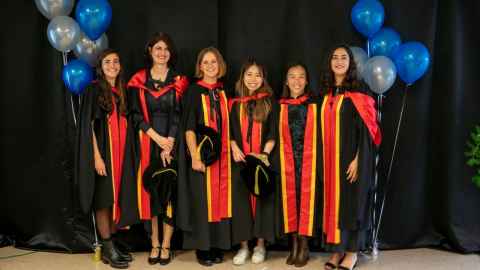Bioengineering talent across the sciences and across the globe
3 May 2023
Diversity of backgrounds, science and research is driving success at the Auckland Bioengineering Institute as 25 ABI graduands cross the stage this week.

Becoming a medical doctor was the original dream for Debbie Zhao but despite having applied twice to Medical School — and being accepted twice, the pull of bioengineering was too enticing.
This week, the Auckland Bioengineering Institute (ABI) is celebrating the award of 18 PhDs and seven Masters of Engineering to its new graduands. Debbie Zhao is one of seven women from ABI donning academic regalia to graduate with a PhD from Waipapa Taumata Rau, University of Auckland.
Debbie says the vibrant research environment of ABI, working closely with engineers, cardiologists, sonographers, and patients, and researchers around the world has been an enduring highlight of her study. Her research combined artificial intelligence and 3D ultrasound to explore the heart and ultimately generate automated, accurate, and personalised interpretations of 3D echocardiograms through new methods and datasets for image analysis. She hopes her research will eventually lead to more efficient diagnoses and monitoring of heart diseases.
The brain has been the focus of her fellow graduate Maryam Tayebi’s PhD research, an Iranian born scientist who took a close look at rugby players' brains. Drawing on her background in medical imaging, Maryam delved into an advanced MRI technique called diffusion imaging to explore the effects of concussion and multiple head impacts. She now aims to investigate the brain’s recovery trajectory among methamphetamine users during abstinence.
Further down the ABI corridor, Stephanie Khuu has been using computational modelling to investigate the principles of skeletal muscle mechanobiology and the mechanisms of muscle degeneration in diseases such as cerebral palsy. She is now investigating skeletal muscle biomarkers of elite performance at the Wu Tsai Human Performance Alliance at the University of California San Diego.
ABI is celebrating 18 new PhDs and seven Masters of Engineering across a range of sciences
Joining this year’s graduates is Laura Pedofsky, who had a background in product development and mechanical engineering before she joined the ABI, where she began evaluating sensor and product design for women’s strength training. Her research follows the utility and effectiveness of femfit®, a delicate and novel internal medical device designed by ABI spinout company Junofem. The device is worn inside the vagina to detect pressure and when used in conjunction with a mobile app, can help women isolate and ‘work out’ their pelvic floor muscles.
“As a female engineer, and there are not many of us, it is important to have solutions for women designed by women,” says Laura.
Zahra Aghababaie arrived in New Zealand in 2018 from Iran where she had researched biocompatibility of silver-based nanoparticles and their use in tissue engineering and the use of hydrogels and microparticles with the ability to release drugs.
At ABI Zahra has been uncovering mysteries of the gut and has discovered that ablation, a procedure commonly performed on the heart to treat atrial fibrillation, can be used to modify and correct the naturally occurring electrical control of the stomach.
Zahra is now a research fellow at ABI where she is looking how to implement a medical technique of ablation on the stomach and developing a mathematical model measuring the impact of gastric ablation lesions. This will help minimise the use of animal models in pre-clinical experiments as her research moves toward first-in-human trials. In the future, her discovery may be used to help people with gastro-intestinal symptoms and disorders such as gastroparesis and improve quality their quality of life.
Chemical engineer, Bahareh Madadkhahsalmassi, also came to the ABI from Iran. She has developed an organic electrochemical transistor to sense glucose in the fluid extracted by a jet injector, a medical device that uses a high-pressure stream of fluid to penetrate the skin, instead of a needle. Her work helps propel a new and painless way for people with Diabetes to monitor their blood glucose levels rather than the common finger prick capillary test. Bahar is now Technical Manager at tech company Pyrotek where she is involved in research and development.
Singaporean Sarah Fong Pei Ting, a registered pharmacist from the United Kingdom, completed her PhD in the cardiac field on atrial fibrillation and metabolic syndrome. Sarah has developed new approaches for live cell separation and high-resolution functional mapping and her study offers evidence to test and use personalised medicine by providing experimental data and developing powerful molecular and electrical mapping approaches.
It is wonderful to see the diversity of background of the female PhDs as well as
the diversity in their research topics.
Distinguished Professor Peter Hunter, Director of ABI says it is wonderful to see the diversity of background of the female PhDs as well as the diversity in their research topics.
Three of the women (Stephanie Khuu, Debbie Zhao and Laura Pedofsky) received their Masters and/or Bachelor degrees from New Zealand universities, three more (Maryam Tayebi, Zahra Aghababaie, Bahareh Madadkhahsalmassi) received first degrees in Iran, and one (Sarah Fong) completed a Master of Pharmacy in the United Kingdom.
Their doctoral research topics ranged from studies of brain recovery (Maryam) and skeletal (Stephanie) and cardiac (Debbie) muscle mechanics to pelvic floor muscle function (Laura), atrial fibrillation (Sarah), ablation therapy for GI tract dysrhythmia (Zahra), and new instrumentation for glucose sensing (Bahareh).
“We are very proud of the collegial culture at the ABI, where we celebrate our cultural and gender diversity as well as the very wide range of disciplinary skills that our students bring to their studies. Congratulations to all our graduates and we look forward to the significant contributions that you will all make to society as your careers evolve,” says Distinguished Professor Hunter.
Media enquiries:
Megan Fowlie
E: megan.fowlie@auckland.ac.nz
M: 022 301 0334